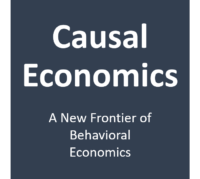Dangerous Nudges
Nudging is all the rage. Many countries now even have their own nudging units.
Nudging can potentially play a role in good policy toward desirable ends, given our innate irrationality. However it is vital that people still have the freedom to make irrational decisions.
Unfortunately, amid all the buzz, nudging is out of the gate as an incomplete policy idea. Nudging on its own can be very dangerous as it can often come down to marketing which benefits those driving the agenda.
The buzz around Nudging needs to be updated with Causal Nudging. This means that truly effective nudging policies must causally couple cost and benefit for all involved, as prescribed by Causal Economics.
Nudging for profit by companies is just marketing and consumers have freedom to be as rational or irrational as they like and bear the costs of their decisions over time.
But government nudging is different.
It may be a noble goal to nudge people to quit smoking, both for the individual’s longevity and for societal health costs. However, this ends up with spending taxpayer money to push a message to certain people that will only somewhat work. It isn’t good policy for taxpayers and for the vast majority of smokers that don’t quit. It turns out to be a free riding benefit for those that do quit, with many others in society footing the bill to get them to eventually make a rational decision.
This not only interferes with freedoms, but is also economically not Pareto Optimal. A much simpler solution is for smokers to have the freedom to smoke and to pay a surcharge on their healthcare taxes with an explanation as to why. That is simple and direct causal coupling. People are free and don’t have to spend their money to try to help some irrational decision makers make better decisions.
